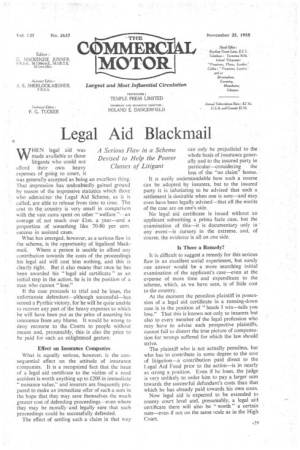Legal Aid Blackmail
Page 31

If you've noticed an error in this article please click here to report it so we can fix it.
WHEN legal aid was made available to those litigants who could not afford their own heavy expenses of going to court, it was generally accepted as being an excellent thing. That impression hasundoubtedly gained ground by reason of the impressive statistics which those who administer the Legal Aid Scheme, as it is called, are able to release from time to time. The cost to the country is very small in comparison with the vast sums spent on other "welfare "—an average of not much over Lim. a year—and a proportion of something like 70-80 per cent. success in assisted cases.
What has emerged, however, as a serious flaw in the scheme, is the opportunity of legalized black mail. Where a person is unable to afford any contribution towards the costs of the proceedings his legal aid will cost him nothing, and this is clearly right. But it also means that once he has been awarded his "legal aid certificate" as an initial step in the action, he is in the position of a man who cannot "lose," It the case proceeds to trial and he loses, the unfortunate defendant—although successful—has scored a Pyrrhic victory, for he will be quite unable to recover any part of the heavy expenses to which he will have been put as the price of asserting his innocence from any blame. It would be wrong to deny recourse to the Courts to people without means and, presumably, this, is also the price to be paid for such an enlightened gesture.
Effect on Insurance Companies What is equally serious, however, is the consequential effect on the attitude of insurance companies. It is a recognized fact that the issue of a legal aid certificate to the victim of a road accident is worth anything up to f200 in immediate "nuisance value," and insurers are frequently prepared to make an immediate offer of such a sum in the hope that they may save themselves the much greater cost of defending proceedings—even where they may be morally and legally sure that such proceedings could be successfully defended.
The effect of settling such a claim in that way can only be prejudicial to the whole basis of insurance generally and to the insured party in particular—considering the loss of the "no claim" bonus.
It is easily understandable how such a course can be adopted by insurers, but to the insured party it is infuriating to be advised that such a settlement is desirable when one is sure—and may even have been legally advised—that all the merits of the case are on one's side.
No legal aid certificate is issued without an applicant submitting a prima facie case, but the examination of this—it is documentary only in any event—is cursory in the extreme, and, of course, the evidence is all on one side.
Is There a Remedy?
It is difficult to suggest a remedy for this serious flaw in an excellent social experiment, but surely one answer would be a more searching initial examination of the applicant's case—even at the expense of more time and expenditure to the scheme, which, as we have seen, is of little cost to the country.
At the moment the penniless plaintiff in possession of a legal aid certificate in a running-down case is in the position of "heads I win—tails you lose." That this is known not only to insurers but also to every member of the legal profession who may have to advise such prospective plaintiffs, cannot fail to distort the true picture of cornpensadon for wrongs suffered for which the law should strive.
The plaintiff who is not actually penniless, but who has to contribute in some degree to the cost of litigation—a contribution paid direct to the Legal Aid Fund prior to the action—is in nearly as strong a position. Even if he loses, the judge is very unlikely to order him to pay a larger sum towards the successful defendant's costs than that which he has already paid towards his own costs.
Now legal aid is expected to be extended to county court level and, presumably, a legal aid certificate there will also be " worth " a certain sum—even if not on the same scale as in the High Court.




































































































